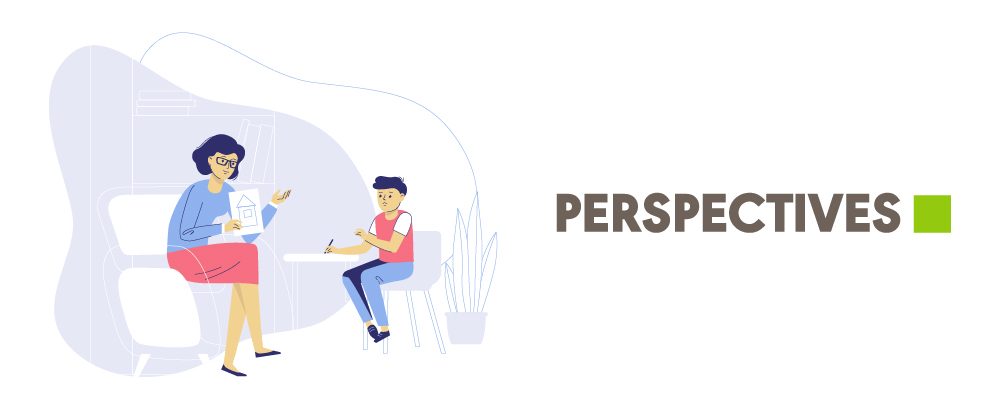As we wrap up Autism Acceptance Month, we’d like to focus on school-based speech-language pathologists (SLPs), who are most likely to be working with this population daily. Special Interest Group 1, Language Learning and Education, has been presenting an annual autism forum in Perspectives of the ASHA Special Interest Groups for the past 10 years, focusing on presenting resources and guidance for SLPs working in the schools.
All Communication Is Equal
The title of this year’s forum is “Communication Choice and Agency: Thinking Beyond Spoken Language for Individuals on the Autism Spectrum.” Forum Editor Amy Donaldson writes that autistic adults who use augmentative and alternative communication (AAC) describe a “forced communication choice” toward verbal language and away from AAC as children.
The articles in this forum showcase the importance of fully partnering with autistic individuals and their families when looking at communication options. Check out summaries of all four of these articles below!
Communication Choice and Agency
In the first article of the forum, Laurent and Fede show how researchers can collaborate with autistic individuals to design necessary supports. In this case, the community collaboration resulted in tools and strategies to support autistic people with emotional and energy regulation.
Children who are on the autism spectrum may have difficulty communicating in traditional ways—and could benefit from AAC. In their work, Lund and colleagues combined a scoping research review, video observation, and interviews with experts in AAC to find themes when performing a communication assessment for these individuals.
In the third article, Donaldson and colleagues examine the experiences of speaking autistic adults who use AAC. By sharing these individuals’ successes and challenges, as well as recommendations for families and professionals, the authors highlight the importance of agency for autistic people when making a communication choice.
Finally, Vidal and DeThorne focus on the interactions of one minimally speaking autistic child who is an AAC user and his classmates. Unlike traditional peer-mediated interventions, which use allistic students as facilitators or mentors, this supports-based approach focuses on equity.
We’d like to thank Dr. Donaldson, as well as all of the authors and reviewers, for their contributions to this forum. We’d also like to thank SIG 1 for their dedication to celebrating Autism Acceptance Month for 10 years in a row! You can read the forum here, or explore the individual articles below.
About Perspectives
Articles in Perspectives typically highlight knowledge translation, serving as a unique bridge between research and practice. Perspectives is available to affiliates of any of ASHA’s 19 Special Interest Groups (SIGs) and to individual and institutional subscribers worldwide. These articles are available for free—even to those who are not affiliated with a SIG—through May 10 in recognition of Autism Acceptance Month.
SIGs focus on a variety of special topics in the professions of audiology and speech-language pathology—from school-based settings to speech science. You can find more information on the SIGs, including which one is right for you, here!
Explore the Forum
Donaldson, A. L., corbin, e., & McCoy, J. (2021). “Everyone deserves AAC”: Preliminary study of the experiences of speaking autistic adults who use augmentative and alternative communication. Perspectives of the ASHA Special Interest Groups, 6(2), 315–326. https://doi.org/10.1044/2021_PERSP-20-00220
Laurent, A. C., & Fede, J. (2021). Leveling up regulatory support through community collaboration. Perspectives of the ASHA Special Interest Groups, 6(2), 288–305. https://doi.org/10.1044/2020_PERSP-20-00197
Lund, S. K., Weissling, K., Quach, W., & McKelvey, M. (2021). Finding a voice for individuals with ASD who are minimally verbal through comprehensive communication assessment. Perspectives of the ASHA Special Interest Groups, 6(2), 306–314. https://doi.org/10.1044/2021_PERSP-20-00227
Vidal, V., & DeThorne, L. (2021). Effectiveness of a supports-based approach to peer interactions of an autistic student in the classroom: A mixed-methods study. Perspectives of the ASHA Special Interest Groups, 6(2), 327–343. https://doi.org/10.1044/2021_PERSP-20-00223
¹Intentional use of identity-first language; see Gernsbacher (2017) for further information. ASHA adheres to the style guide of the American Psychological Association (APA) in using person-first or identity-first language to describe attributes and diagnoses of individuals or groups of people. When there is a preference, ASHA honors that preference. Listen to this episode of the ASHA Voices podcast for more on the use of identity-first and the use of person-first language in autism.









